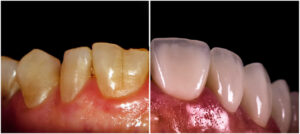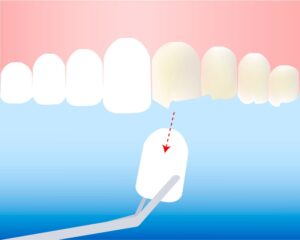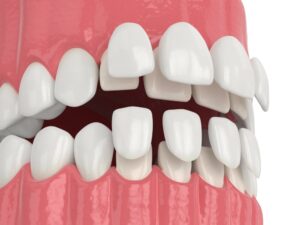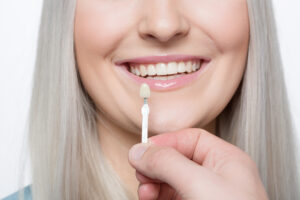A fairly frequent question today is: How soon after dental implants can I eat normally? It is asked both by people who have just had dental implants, and those who plan to have them in the future. You will find the answer to that question and others related to this topic in this article that we have written especially for you. We take care that after performing any dental procedure, you enjoy an optimal quality of life.
Miami Perfect Smile: the best dental implants in Miami
If you have been looking for a clinic where you can undergo dental implant treatment in Miami, you have just come to the right place. We have everything you need to make your smile look like you always dreamed of: perfect but natural, radiant but elegant, renewed but yours. We perform dental veneers, smile design, all types of dental implants, and other procedures. Follow the link we just inserted, to access our data and contact us or to schedule your first appointment and find out all the details.
Our treatments are carried out with the highest quality materials and state-of-the-art technology, to make your smile look perfectly aesthetic and natural. Your well-being is our goal. In our facilities, you will receive the careful and specialized treatment that you deserve. Read the opinions of our patients and check their high degree of satisfaction with our treatments. Pleased patients are our best promotion.

It should be added that at Miami Perfect Smile we accept all types of insurance and plans with which the patient is covered. And something important: our prices are very reasonable. You can investigate, and you will see the excellent quality/price ratio that we offer you. It is worth noting that many people travel to Florida to undergo dental implant treatment in Miami. Despite the travel expenses, our prices are still more reasonable than those in other States.
What is the dental implant procedure like?
A dental implant is a replacement for a missing tooth root. Dental implants are used when it is not only the tooth that the patient has lost but also the root. The complete treatment of dental implants includes both the placement of the implant and the subsequent placement of the prosthesis or dental crown for which the implant was placed. First, the case is studied well to determine how to proceed. Only then is the intervention performed to place the implant(s). An incision is made in the gum first, and then the implant is inserted into the jawbone or maxilla.
Whenever a dental implant is placed, you have to wait a while for it to osseointegrate, that is, until it integrates with the bone tissue of the patient’s jaw or maxilla. After the implant (which can be made of titanium, zirconium or other materials) has perfectly osseointegrated with the bone tissue, the dental crown is placed on the implant.
Both the time of healing from the surgical incision that is made to the gum and the time of osseointegration of the implant to the bone, depend on each patient. And since the correct healing and osseointegration of dental implants depend on how we use our mouth and teeth during the process, what we eat and when we eat is of great importance.
That is why dentists devote great attention to guiding their dental implant patients, what they can eat and what they are forbidden from eating after the operation, as well as the waiting times to continue eating normally after the intervention.

When and how to eat after getting dental implants
The answer to the question “How long after dental implants can I eat normally?” is relative. This question does not have a single answer, since eating “normally” will mean different things depending on the time that has elapsed since the surgical intervention to place the implants.
For this question, we will give in this section three extended answers. This is because it is not the same to eat normally during the first 4 postoperative days (in which extreme care must be taken) than to eat normally after the 2 weeks after the operation (after the gum has healed and the gums are removed). stitches), then eating normally after 15 weeks (when the dental implant is already integrated into the bone and is almost part of the patient’s body).
However, a general answer to the question can be given, and it is this: The patient can continue to eat normally after about 8 weeks. The time of greatest postoperative dietary restrictions is between 48 and 96 hours after surgery (as we will see in more detail shortly). However, this normality does not imply failing to take care of the teeth or not complying with the dietary advice that we will give.
While the wound heals and the implant osseointegrates, there are some guidelines regarding waiting times, which the patient must follow to the letter. So, here you have summarized in 3 points, the answer to the frequently asked question: How soon after dental implants can I eat normally? as well as other questions related to waiting times after receiving dental implant treatment.
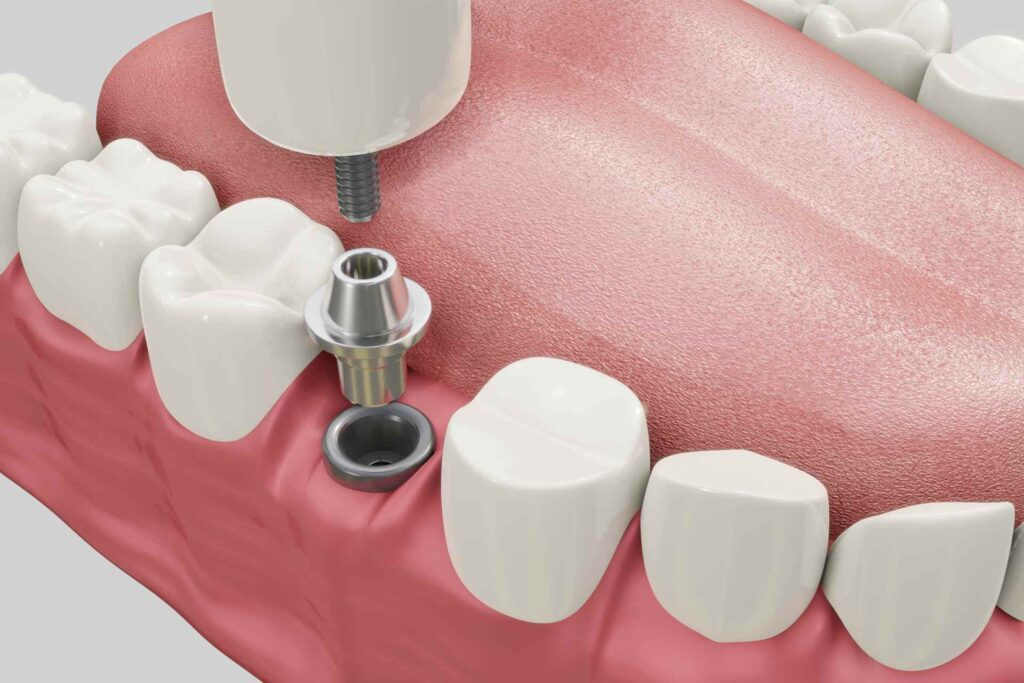
Before continuing, it is important to say that the waiting times that we will now give should be longer when more than one dental implant has been placed, especially if incisions were required on both sides of the mouth. The feeding tips that we will now give are only indicative. It is best that you solve any doubts with your dentist since on the Internet and in the media, you can find very different or even contradictory criteria on these issues.
1) Maximum caution during the first 4 postoperative days
With regard to food, after dental implant treatment, the following regimen must be followed during the first 4 postoperative days (the number of days may vary depending on the complexity of the surgical intervention):
- In general, it is recommended to drink plenty of water and cold or room temperature beverages.
- No hot or spicy foods should be consumed in the first 48-96 hours (2-4 days). Fresh or cold foods will help relieve the swollen gums after the operation and will prevent bleeding. Hot food would do the opposite.
- Feeding solely on a soft diet is required for 48-96 hours (although it is optimal to extend the soft diet until the stitches are removed from the wound). They can be pureed foods, soft foods, or at least finely mashed. As the soft diet is usually low in protein, it is recommended to pay attention to soft sources of protein or consume protein nutritional supplements.
- Some examples of foods suitable for a soft diet are: soft and well-ripened fruits (not containing seeds) such as bananas and papayas, fruit juices and smoothies, creams, soups and broths (without bones or other hard ingredients), purees, jellies, guacamole, mushrooms, cottage cheese, cottage cheese, mozzarella, tofu, milk, ice cream, yogurt, fish, and soft meats (either steamed or grilled). If bread is consumed, it must be sliced or crustless loaves.
- In any case, during the first 4 days you must avoid foods that have peaks, edges or rigid edges. In this way you avoid hurting the gum or causing any injury.
- Avoid using straws for the first 24 hours after surgery.
- Until the stitches are removed, you should chew on the side of the denture opposite the wound side.
- Although it may be annoying to eat, you have to eat. The patient should not remain without nourishing everything their body needs. Good nutrition helps with wound healing and maintains good spirits.
- The patient should use salt water mouth rinses 3 to 4 times a day, but after 24 hours, never before.

2) Medium caution after 2 postoperative weeks
After surgery to place dental implants, postoperative pain and discomfort should not last for more than a short time, ranging from 1 week to 10 days. In any case, they should not go beyond 2 weeks or 14 days. If the postoperative pain lasts more than 2 weeks, you should consult the dentist to evaluate the case, because complications may occur.
Between 1 and 2 weeks after the procedure to place the implants, the patient will likely have the stitches removed. After this waiting time, the patient should only maintain a normal level of precaution regarding their diet. It is not necessary to be extreme in the choice of food, but only in maintaining certain general precautions. For example:
- It is not advisable to chew intensively during the first 2 weeks after the operation. It is best to extend that advice to the first 8 weeks after surgery, which is when osseointegration begins to occur for patients at the earliest.
- During the first 6 postoperative weeks, it is best to avoid compact grain or seed or cereals, or any other compact and sticky food that can lodge in the area of the incision and implant. As this area cannot yet be brushed vigorously, preventing food from staying in that area removes the possibility of infection or poor healing.
- After a month has elapsed since the operation of the implants, some foods can be added to the diet. For example, other soft but lean meats.
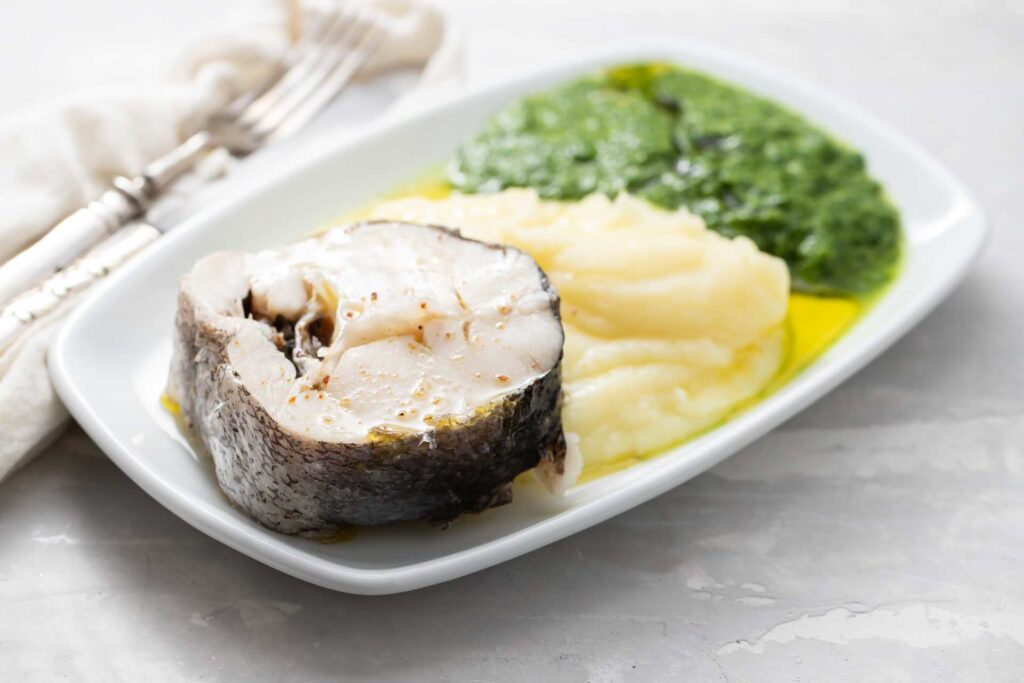
3) General precaution until osseointegration (about 15 weeks)
After a certain amount of time (the specific time will depend on each person, but in general it is usually from 6 weeks to 15 weeks, or a little more), the dental implants are finally assimilated by the body. The bone tissue covers the implants thanks to the osseointegration process (in cases of titanium implants) or biointegration (in cases of zirconium or zirconia implants).
With this, it is time to place the crowns or dental prostheses, and the time of special care regarding food comes to an end. The patient can begin to eat normally, while always respecting the principles of common sense for the care of natural or artificial dentures:
- Do not chew or bite food or objects that are too hard or sticky.
- Avoid eating nuts that are hard.
- Avoid or moderate the consumption of foods that are too sugary or fatty.
- Do not chew ice or equivalent substances that are too hard.
- Avoid the habit of chewing only with the side of the denture where the implants are.
Importance of the correct diet for the duration of the implants
Dental implants last for at least 20 years. However, durations of between 35 and 40 years are documented, that is, twice as long. This extended duration greatly contributes to the patient’s attitude regarding all care measures related to feeding at each stage.
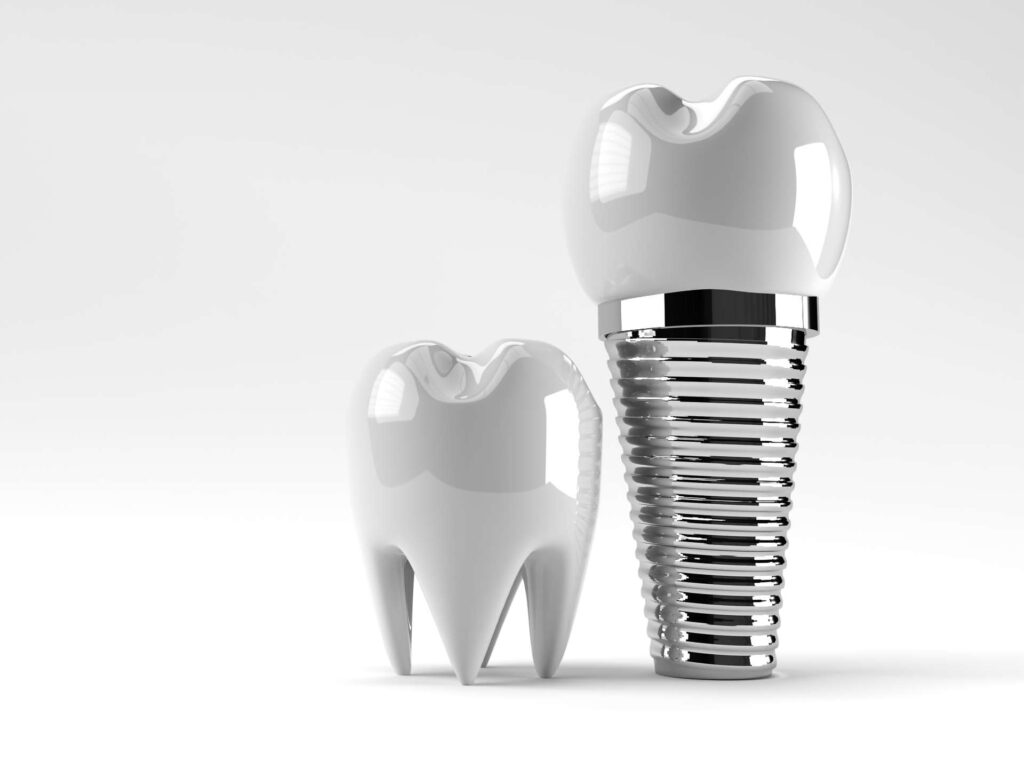
Undoubtedly, if the feeding guidelines are well followed during postoperative healing, and until the osseointegration of the implant occurs, as well as the rest of the time, an optimal duration of the implants will be achieved.
The duration of the implant (which is almost always screwed to the bone, but can sometimes be cemented) is not exactly the same as the duration of the dental prosthesis or crown that is placed on the implant. Implants, if taken care of and if the patient follows the nutrition and hygiene advice, can last longer than prostheses. Porcelain crowns (either traditional porcelain or zirconia) typically last longer than crowns made of composite resin, which are more sensitive to wear from food and other chemicals that enter the mouth.
Do dental implants hurt?
Another question frequently asked by patients is: Do dental implants hurt? This question can be answered from two points of view. The first point of view responds to whether the dental implant placement procedure hurts, while the second point of view refers to whether, once the dental implants are placed and osseointegrated, they hurt when the patient chews or bites.
The answer to the first question is that the implant placement surgical procedure itself does not hurt, thanks to the fact that it is performed under anesthesia. Normally the anesthesia that is applied is local, although for some patients general anesthesia can be applied. Surgical intervention is simple (make an incision in the gum and screw the dental implant to the maxillary or mandibular bone).
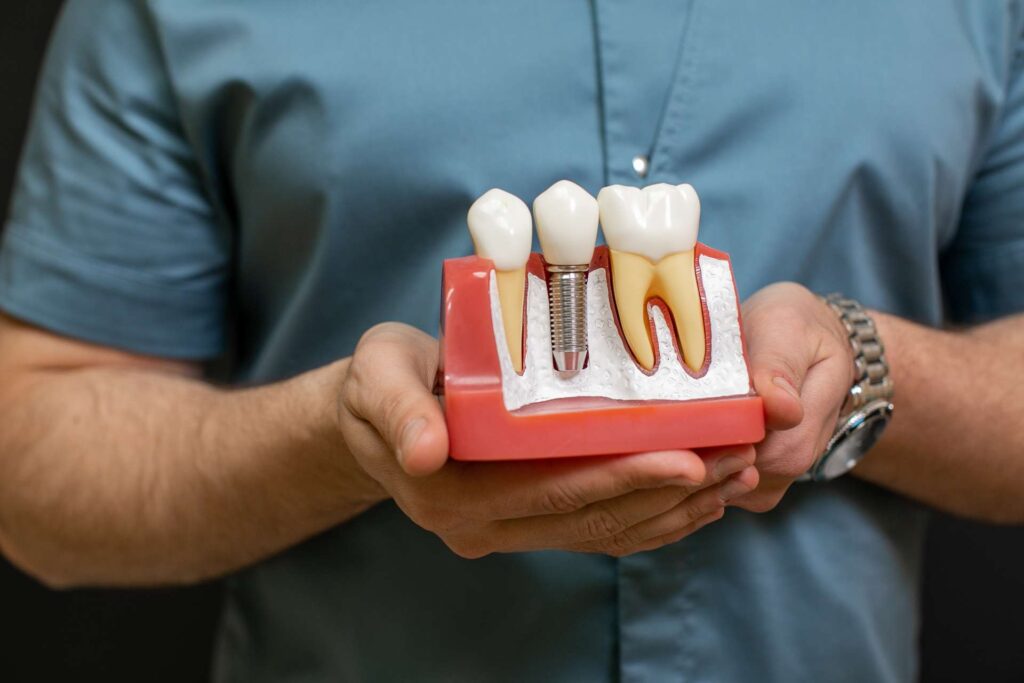
However, as with any simple surgical intervention, it can be a bit painful during the healing and osseointegration period. It will be a non-intense pain, located in the area of the incision, and that occurs in episodes. For some people, these pains end very soon, in a few days. But in any case, they should not last more than 10 days or 2 weeks at most.
If the pain extends beyond this number of days, you should visit the dentist who is performing the treatment, because some complications may have occurred. Dental implant treatments have a success rate of 98 to 99% of cases, so complications are very rare. But they can happen, and pain beyond 2 weeks can be a symptom of it.

Now answering the other question, the one that refers to whether it hurts to chew or bite when using dental implants, the answer is no. If the dental implants are well placed and osseointegrate, the comfort of use is so remarkable that sometimes the patient will forget that they have dental implants. Of course, we reiterate that you must follow the care standards for any denture, whether natural or artificial:
- Maintain oral hygiene standards and any other advice given by the dentist.
- Do not bite or chew food that is too hard or sticky.
- Reduce or eliminate the consumption of cigarettes or excess alcohol.
- Do not bite your nails and avoid bruxism (teeth grinding).
- Do not use your teeth as tools to split, open, or hold objects.
- Avoid blows, exercises, and sports where the teeth are at risk.
- Visit the dentist with some frequency (not less than 1 time a year).
- Among others.



